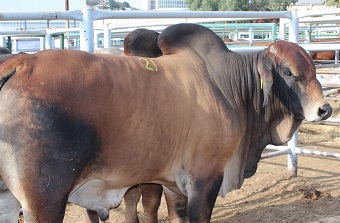Farmers who participated in the biannual Namibia Genetics Auction Group’s event hosted at the Agra Bank Windhoek Ring in Windhoek this week, achieved an average of N$ 39,000 for bulls and close to N$24,000 for heifers and cows.
The auction, also broadcast online, saw the sale of 120 cattle, comprising 40 bulls and 80 heifers and cows from 15 breeders. The highest price at the auction was N$65,000 paid for a Simbra bull.
“Fewer bulls were sold than the previous auction in April, although the quality of the animals on offer was good,” said Namibia Genetics Auction Group leader Bianca Lueesse. “This is probably due to Covid-19 restrictions as buyers were not able to see the bulls in advance to be able to make a decision.”
Lueesse said the auction was satisfactory regarding heifer and cow sales. “Most farmers are still building their herds after the 2019 drought, and females are in high demand,” she said. Asked how the pandemic has impacted the Group, Lueesse replied that it was challenging since the animal’s usual upkeep was disrupted due to members getting infected with the virus. “Fortunately, we did not lose any members,” said Lueesse.
Established in 2011 and sponsored by Bank Windhoek, the Namibia Genetics Auction Group comprises 15 members specialising in seven different cattle breeds. It is the biggest cattle breeding group in the country based on membership and breeds bulls and cows best suited to Namibia’s harsh environment.
The Group holds two annual auctions, one in May and another in August.
“We have a great relationship with Bank Windhoek, and for the past three years, we have stepped up our marketing. These developments are because of the Bank’s support, which has made our auctions bigger and better,” said Lueesse.
Bank Windhoek’s Executive Officer of Retail Banking Services and Specialist Finance, James Chapman, said the Bank remains committed to supporting the agricultural sector.
“Even though the sector has experienced good rains and higher prices in the meat industry, the sector continued to experience certain challenges like late harvests and veld fires in large parts of the country this year. It remains one of the key sectors of the Namibian economy, especially for job creation,” he said.
“At Bank Windhoek, we understand this and will continue to support the agricultural sector because we believe that the sector is resilient and will continue to stand the test of challenging times.”
Lueesse concluded by thanking Bank Windhoek for its support over the years. “The Bank’s support allows us to contribute to the country’s food production in terms of cattle farming, and we are grateful.”



